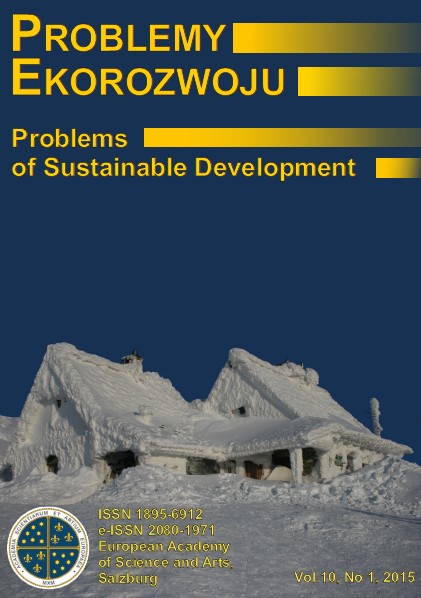Religion versus Sustainable Development. The Problem of Human Eco-development in the Teachings of John Paul II and Benedict XVI
Article Sidebar
Issue Vol. 10 No. 1 (2015)
-
Sustainable Development Integrated in the Concept of Resilence
Jürg Bloesch, Michael von Hauff, Klaus Mainzer, S. Venkata Mohan, Ortwin Renn, Verena Risse, Yonghui Song, Kazuhiko Takeuchi, Peter A. Wilderer7-14
-
Uneven Integration and Blocked Spillovers: Why Environmental Governance in Northeast Asia does not Converged to the EU Model?
Liang Dong15-20
-
The Issue of Environmental Resources Management in the Light of the Model of Tragedy of the Commons – Systemic Approach
Mariusz Dacko21-30
-
Religion versus Sustainable Development. The Problem of Human Eco-development in the Teachings of John Paul II and Benedict XVI
Artur Niechwiej SI31-40
-
Environmental Regulations and Industrial Performance Evidence from the Revision of Water Pollution Prevention and Control Law in China
Wei Yu, Qiang Chen41-48
-
Sustainable Development as Seen by the Residents of Eastern and Western Europe on the Basis of ISSP Environment Data
Paweł Rydzewski49-53
-
Biofuel’s Sustainable Development under the Trilemma of Energy, Environment and Economy
Heqing Liu55-59
-
Joseph Kozielecki’s Concept of Transgressive Man and the Problems of Sustainable Development
Marek Tański61-66
-
A Process Model of Building Sustainable Competitive Advantage for Multinational Enterprises: An Empirical Case Study
Mengmeng Shan, Jianxin You, Yulu Wang, Huchen Liu67-78
-
The Development of Organic Food Market as an Element of Sustainable Development Concept Implementation
Paweł Bryła79-88
-
Challenges to Sustainability of Resource-exhausted Cities: A Case Study of Lengshuijiang, China
Guocun Zuo, Qiang Chen89-98
-
Application of Environmental and Social Sustainable Measures by Port of Koper: The Basis for the Regional Approach
Bojan Beškovnik, Patricija Bajec99-106
-
The American Lawn Revisited: Awareness Education and Culture as Public Policies Toward Sustainable Lawn
Yaoqi Zhang, Bin Zheng, Ge Sun, Peilei Fan107-115
-
Sustainable Mitigation of Methane Emission by Natural Processes
Cao Yucheng, Wojciech Cel117-121
-
Sustainable Bridge Design
Sławomir Karaś, Janusz Bohatkiewicz123-132
-
Book Review: How to Teach on Sustainable Development Issues? G Venkatesh, Water For All and Other Poems, Cyberwit.Net, 2014
Artur Pawłowski133
Archives
-
Vol. 12 No. 2
2017-07-03 18
-
Vol. 12 No. 1
2017-01-02 16
-
Vol. 11 No. 2
2016-07-01 17
-
Vol. 11 No. 1
2016-01-04 20
-
Vol. 10 No. 2
2015-07-01 17
-
Vol. 10 No. 1
2015-01-05 16
-
Vol. 9 No. 2
2014-07-01 16
-
Vol. 9 No. 1
2014-01-02 19
-
Vol. 8 No. 2
2013-07-01 13
-
Vol. 8 No. 1
2013-01-02 12
Main Article Content
Authors
Abstract
The problem of sustainable human development, in terms both of individual people and societies, represents an integral part of the Christian anthropology and Catholic doctrine. The Magisterium of the Catholic Church has expressed its view on this issue on many occasions. This topic was also commented on by two popes – John Paul II and Benedict XVI. Eight encyclicals have been analysed by the analytical-critical method. Those written by John Paul II are Redemptor Hominis, Laborem Exercens, Sollicitudo Rei Socialis, Centesimus Annus and Evangelium Vitae, whereas those created by Benedict XVI are Deus Caritas Est, Spe Salvi and Caritas in Veritate. The popes’ manifestos were to a large extent universal messages addressed to the whole mankind. Their main theses, which were formulated in the context of sustainable development, are:
- Man is not only the master, but also a part of the creation. That is why he is responsible for and has to take care of animate and inanimate world.
- One should rather be than possess.
- The human progress is something desirable. The lack of equal division of natural resources and their wasteful exploitation are among the main reasons behind disproportions in the steady development of societies.
- Ecology of man, understood as a set of actions undertaken to improve the natural and moral structure of societies, should be prioritized as one of the activities aimed at facilitating sustainable development.
- In the era of quickly progressing globalisation ethics should have primacy over technology.
- It is necessary to respect each person’s dignity and life from their conception until their natural death as a way of building the civilisation of love.
- In the globalised world people should follow the logic of love for another human being and the whole creation and they should work for the common good.
- Globalisation as such morally neutral. It is as man who gives it an ethical (bad or good) meaning by his actions.
Keywords:
References
BENEDICT XVI, Caritas in Veritate (CiV), Rome 2009.
BENEDICT XVI, Deus Caritas Est (DCE), Rome 2005.
BENEDICT XVI, Spe Salvi (SpS), Rome 2007.
JOHN PAUL II, Centesimus Annus (CA), Rome 1991.
JOHN PAUL II, Evangelium Vitae (EV), Rome 1995.
JOHN PAUL II, Laborem Exercens (LE), Rome 1981.
JOHN PAUL II, Redemptor Hominis (RH), Rome 1979.
JOHN PAUL II, Sollicitudo Rei Socialis (SRS), Rome 1987.
JOHN PAUL II, Populorum Progressio (PR), Rome 1967.
The Holy Bible: Det: the Book of Deuteronomy, Gal: the letter of saint Paul to the Galatians, Gen: the Book of Genesis.
Vaticanum II, Gaudium et Spes (GS), Rome 1965.
Article Details
Abstract views: 84
License

This work is licensed under a Creative Commons Attribution-ShareAlike 4.0 International License.


